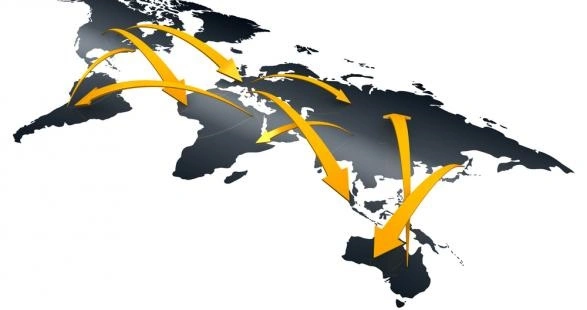commerce et echanges entre pays
Publié le 27/02/2008
Extrait du document

ECONOMICS COURSEWORK 3
The article ‘China duties to hit US chicken imports’ published on the 26th of September 2010 talks about the decision undertaken by the Chinese government which is to impose ‘import duties on US chicken imports’. This has happened since a ‘trade war’ has exploded; America had before imposed a tariff on Chinese imports, which causes the Chinese government to set some as well.
It also states how China keeps it s currency low in order to boost exports, which damages the US exports to China.
A tariff is a tax charged on imported goods. The diagram below shows the impact of a tariff on the domestic market.
There is a shift in the world supply curve since the tariff is placed on the goods produced by foreign producers, not domestic. By imposing a tariff, China increases domestic production to 0Q3, which therefore increases revenue to g+a+b+c+h. The US will now supply Q3Q4 and receive Pw+T but also have to pay the price of the tariff. This causes their revenue to fall from h+i+j+k to i+j.
As said above, the American government had previously imposed a tariff on Chinese imports. This caused an increase in their domestic production and a decrease in that of the foreign producers. This is the reason why China decided to impose tariffs which now both countries to compete with protectionism policies instead of trading.
Initially, what caused this ‘trade war’ to begin was the fact that China keeps its currency low on purpose. In the article, we are told that America accuses China to be ‘keeping the Yuan artificially low to help its exporters.’ This means that China has a managed exchange rate. An exchange rate is the value of one currency expressed in terms of another currency. In this case, U.S. dollar = 6.67058007 Chinese Yuan
On the diagram above, we can see that supply in the Chinese currency increases. This is due to the fact that the level of exchange rate at which the currency should be, ER1, is higher than where the currency actually is (ER2). In order to conserve its currency at that level, the government has to sell its own currency and buy a lot of Dollars ($). This will increase the supply in the Yuan, represented through a outward shift of the supply curve on the diagram, and therefore increase the demand for American Dollars ($). As a result, the value of the Dollar will be appreciated, causing the Chinese currency to stay low. This is a measure that a government would take in order to boost exports and make money by speculating on the US Dollar; by having a lower value of the Yuan compared to the Dollar, Chinese speculators can sell their currency, buy Dollars and later on buy the Dollar again, at a cheaper price, therefore make a benefit.
A quota could also be used since they are a physical limit on imports in terms of volume or value. With the imposition of such a policy, importers are not allowed to supply more chickens, because they have filled they quota, and domestic producers can therefore enter the market easier, which leads to the increase of their revenue to a+c+d+f+i+j while the revenue of foreign producers decreases from b+c+d+e to b+g+h. The diagram below illustrates the theory.
The imposition of tariffs and quotas are part of protectionism. Even though such measures may raise the government’s revenue, correct a balance of payments deficit, protect domestic employment and dumping, protectionism has a negative impact on trade. It may decrease economic growth but also reduce the potential level of the world’s output since resources would be used inefficiently.
China and the US should ask themselves if maybe they should not stop using protectionist measures and use the advantages of trade. In this case, domestic and foreign firms will have to be more efficient in order to compete, except this time, the ‘trade war’ will be won by the best country, not the one that can impose the most important amount of protectionist measures.
Liens utiles
- Le commerce favorise-t-il la paix ? Echanges et pacificisme
- Le commerce international est-t-il dû principalement à des différences économiques entre les pays ?
- Après la chute du communisme, l'effondrement du commerce avec l'ex-URSS a plongé ce pays dans de graves difficultés économiques.
- plantation (géographie) 1 PRÉSENTATION plantation (géographie), grande exploitation agricole des pays tropicaux dont la production est destinée au commerce.
- Le commerce a-t-il pour effet de rendre les rapports humains plus justes ? (ou Echanges et Paix)































